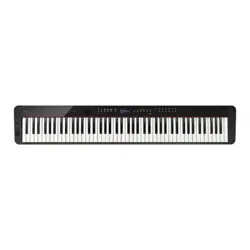Loading ...
Loading ...
Loading ...

Digital Piano Operations
EN-40
You can use the registration function to register the setup of
the Digital Piano (tone, rhythm, and other settings). You can
recall a registered setup as required to perform a particular
song, etc.
• Registration operations can be performed in the RHYTHM
Mode (page EN-12) or ACCOMP Mode (page EN-12).
• Registration operations cannot be performed in the SONG
Mode (page EN-12), while demo play (page EN-14), music
presets (page EN-38), or any setting operation (page
EN-53) is in progress.
■ Setup Storage Locations
Setup registrations are stored in memory locations that are
divided into 24 banks. Each bank has four storage areas,
which means you can register up to 96 setups (24 banks × 4
areas).
• Use the bq BANK button to specify a bank.
• Specify an area using the br Area 1 to ck Area 4 buttons.
■ Registration Memory Data
*1 The “Freeze” column shows the names of parameters
included in the “FREEZE” directory (FUNCTION
parameter 58). For details, see “Freeze Function” (page
EN-42).
*2 Special setting item for cm (K1) and (K2) knob operations.
For information about knob settings that can be registered
in a setup, see “Knob Set List” (page EN-78).
■ Saving to an External Device
Setups saved using registration can be saved to a USB flash
drive in bank units. See “USB Flash Drive Operations” (page
EN-62).
Registering and Restoring a
Setup (Registration)
Area 1
…
Area 4
Bank 1 Setup 1-1
…
Setup 1-4
Bank 2 Setup 2-1
…
Setup 2-4
.
.
.
.
.
.
Bank 24 Setup 24-1
…
Setup 24-4
bq
br bs bt ck
Setting Items Freeze*
1
Rhythm number, mode selection
(ACCOMP Mode or RHYTHM Mode),
synchro start standby, Auto
Accompaniment settings (chord input
mode, Auto Accompaniment volume)
Accompaniment
Tempo Tempo
Tone numbers (Upper1, Upper2, Lower),
Layer enable/disable, Split enable/
disable, DSP (type, parameter),
keyboard volume setting, part settings
(volume, octave shift, fine tune), duet
setting
Tone
Split point Split Point
Auto harmonize/arpeggiator (enable/
disable, type, other settings)
Arpeg./A.Harmo.
Transpose Transpose
Scale settings (type, base note, Stretch
Tuning, Auto Accompaniment scale)
Scale Tuning
Touch Response settings Touch Response
Chorus type, brilliance settings Effect
Hall simulator/reverb (enable/disable,
type, depth), surround (enable/disable,
type)
Sound Mode
Damper pedal function, expression/
assignable pedal function, pitch bend
range, part settings (Pedal Unit, damper
pedal, expression/assignable pedal,
pitch bend wheel)
Pedal/Wheel
Knob settings*
2
Knob
Loading ...
Loading ...
Loading ...
